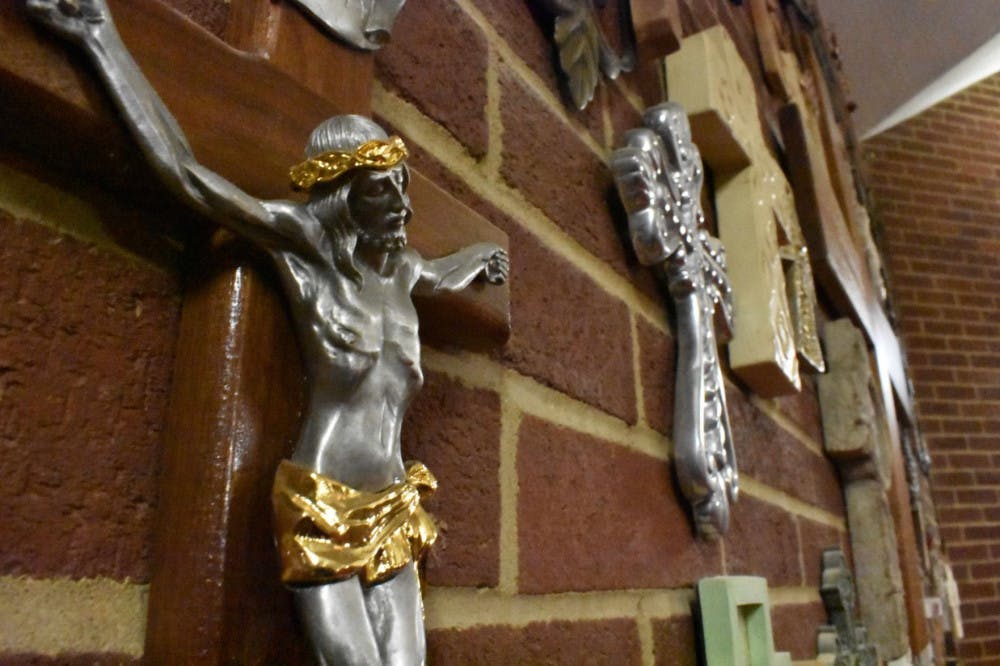Individuals from World Mission Society Church of God in Southaven, Mississippi, have been approaching students and promoting their belief in “God the Mother.”
These individuals’ presence and their current criminal trespass status was made public to University of Memphis staff and students through an email sent out by Mary Balée, chief of U of M police, on Jan. 30.
Accompanying the email’s description of the individuals “aggressively attempting to discuss religion and distribute literature” were accounts of the individuals approaching or cornering students and stressing their doctrine, as previously reported in The Daily Helmsman. Christians from religious organizations on campus said forcing religious views on others goes against their beliefs.
“I believe Christianity to be invitational,” said Rick Pinkston, campus minister for the Wesley Foundation, a United Methodist group on campus. “The church and its members are door-openers but never people whose role it is to force people through that door or really even to consider that door.”
Baptist Collegiate Ministry (BCM) member Ally Porter said experiences like these contribute to a belief of Christians being forceful and aggressive, making it increasingly harder for her to spread the Gospel to others.
“It’s become so ‘natural’ to where anytime I try and just go share God’s love, people are like, ‘oh, are you going to force this down my throat because that’s what’s happened in the past,’” Porter, a 20-year-old education major from Memphis, said.
Porter also said the group is “distorting what the Bible says.”
“Nowhere in the Bible does it say there is a form of God as ‘God the Mother,’” Porter said. “There is only God the Father, God the Son and God the Holy Spirit, so they’re misrepresenting what Christians believe in the Bible by saying this and bringing this on the campus.”
Like Porter, many other Christians at the U of M said the “God the Mother” group actions made it difficult to share their beliefs. Crystal Daugherty, a campus minister for SOMA, a Church of Christ campus organization, said these encounters feed pre-conceived notions of Christian nature and create “a difficult environment for Christian students to express their religion.”
“Clearly, I think if they have ill intent, and if they’re trying to shove any religion in someone’s face, that’s not a good thing,” Daugherty said. “If that is a student’s only interaction with a ‘so-called Christian’ and it’s negative, that makes it harder for me to claim that I’m a Christian and not have those stereotypes put on me.”
Daugherty said she was pleased to discover campus police barred the individuals from further harassing students. She said such a presence on campus imposes an unsafe environment for both Christians and non-Christians.
“No one likes to feel like they’re being threatened, especially not on campus where you’re supposed to be safe,” Daugherty said.
Even with the individuals put on criminal trespass status, some Christians are still concerned about the implications their actions on campus. Emily Hassell, an 18-year-old nursing major and BCM member, said this attention puts a “bad spotlight” on Christians.
“I don’t ever want to put a religion down, even if I don’t believe it’s right or true, but because of the repercussions that have come with it, it’s not good,” Hassell said. “It puts a lot of bad publicity on Christianity itself. It’s not at all what Christianity is, and it puts a bad name on Christ and His church.”
Hassell said she was disheartened the negative experiences associated with these encounters might deter people from Christianity, but she said she wants to continue to spread what she believes.
“It’s actually encouraged me because we will be faced with trials and tribulations, and this is small,” Hassell said. “It encourages me more to go out and share what we truly are for people to understand that we’re not associated with them. I just pray that we can do more to get away from what that image is about Christianity.”
Christians in the Wesley Foundation, a religious organization on campus, think receiving Christianity is "invitational" rather than "coercive." Like many others, Christians in the Wesley Foundation think forcing beliefs upon other people opposes the teachings of Christ.






